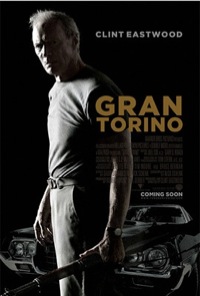Box Office Review: Gran Torino [2009]
Reviewed by Richard Lee Zuras
Released Jan. 11, 2009
1 hr. 56 min.
R
Clint Eastwood/Warner Brothers
Clint Eastwood
Christopher Carley
Bee Vang
Ahney Hur
John Carroll Lynch
 Rumored (falsely) to be the last Dirty Harry film, Gran Torino lives up to that lineage in many ways. Though the film does not center around the old Eastwood character, per se, the bitter, recently widowed, do-it-my-way, violent-but-loveable Walt Kowalski could certainly pass for Inspector Callahan’s long lost twin.
Rumored (falsely) to be the last Dirty Harry film, Gran Torino lives up to that lineage in many ways. Though the film does not center around the old Eastwood character, per se, the bitter, recently widowed, do-it-my-way, violent-but-loveable Walt Kowalski could certainly pass for Inspector Callahan’s long lost twin.
This is a man who seems to have written, or at least read and highlighted, the racist slang thesaurus. His banter is so over the top he puts the audience almost at ease with his verbiage. It is a newer technique to be sure, but one we have seen worked to perfection by the comedy mastermind of one Ricky Gervais. What makes us feel uneasy also serves to disarm us, and after awhile you (or at least the people around you in their shared discomfort) actually begin to laugh at people being verbally slurred. In a sense, we have here the grizzled, four-score result of Harry Callahan’s abusive life span–as the world around him, and his place within it, has changed.
This ex-Korean War “hero” (Walt sees no heroism in killing) is now surrounded, literally, by the Hmong people, and he can’t reconcile himself as to where they came from and why they won’t stay off his lawn. But what is somewhat innocent begins to turn when the neighborhood gang element rears its ugly head. Walt becomes engaged with his community, in seemingly surrogate fashion (Walt is completely un-engaged with his own family), and his attempts to protect his immediate neighbors turns horribly violent.
It is this violence that turns the movie from a comic-like starrer to a 1970s vengeance film. It is less Dirty Harry and more like the little known, 1980 nugget called Defiance. Like Defiance, this is a movie where our hero is unwilling to get involved, but eventually his involvement forces the involvement of the community in its goal to eradicate the street gangs. At the end of both films we are left with a community willing to bear witness, which is sometimes all it takes.
The performances are excellent, with Eastwood having scored noms for Best Actor from the likes of the Chicago Film Critics Association, the Broadcast Film Critics Association, and the National Board of Review. The role of Sue is more than aptly played by first timer Ahney Hur, and the cast as a whole seems to appreciate the difficult mix of dark comedy and violence the picture aims for. The screenplay by little known Nick Schenk received the award for Best Original Screenplay from the National Board of Review–though you may wonder why if you are less than impressed with the third act. But if this is indeed the final act in Eastwood’s storied acting career (as he says it likely is), he has done all of us proud–including one Harry Callahan.
Bottom Line: 4.0/5.0


Leave a Reply